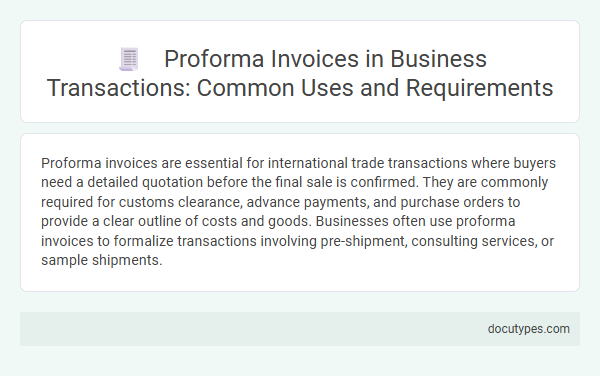Proforma invoices are essential for international trade transactions where buyers need a detailed quotation before the final sale is confirmed. They are commonly required for customs clearance, advance payments, and purchase orders to provide a clear outline of costs and goods. Businesses often use proforma invoices to formalize transactions involving pre-shipment, consulting services, or sample shipments.
Introduction to Proforma Invoices in Business Transactions
What types of transactions require proforma invoices? Proforma invoices are essential in business transactions where a clear outline of goods or services is needed before the final sale. Your use of proforma invoices helps establish terms, prices, and delivery details to avoid misunderstandings.
Defining Proforma Invoice: Meaning and Purpose
A proforma invoice is a preliminary bill of sale sent to buyers before the final commercial invoice. It outlines the details of goods or services, including prices, quantities, and terms, enabling clear communication between parties.
Transactions involving international shipping, custom declarations, or advance payments often require proforma invoices. You use them to provide buyers with an accurate cost estimate, ensuring transparency during negotiation or import processes.
Key Components of a Proforma Invoice
Proforma invoices are typically required for international trade, customs declarations, and pre-shipment agreements. Key components include the seller's and buyer's details, a clear description of goods or services, and estimated costs including taxes and shipping fees. You must ensure the proforma invoice is accurate to facilitate smooth transaction approvals and customs clearance.
Common Uses of Proforma Invoices in International Trade
Proforma invoices are essential in international trade for transactions involving customs declarations and advance payments. They provide a detailed estimate of goods or services before the final sale.
Common uses of proforma invoices include facilitating import and export documentation, securing letters of credit, and helping buyers understand the costs involved prior to shipment. These invoices outline product descriptions, quantities, prices, and terms of sale. You can rely on them to streamline negotiations and ensure clarity between trading partners.
Role of Proforma Invoices in Accounting and Finance
Proforma invoices play a crucial role in accounting and finance by providing a preliminary bill of sale before the final transaction occurs. They are essential for specific types of transactions to ensure clarity and proper financial documentation.
- International Trade - Proforma invoices are required to declare the value of goods for customs purposes and facilitate import/export transactions.
- Pre-Sales Estimates - These invoices serve as formal quotes to buyers, outlining the price and terms before the sale is finalized.
- Advance Payments - They authorize buyers to make partial or full payments prior to the shipment of goods or service delivery.
Legal Status and Limitations of Proforma Invoices
Proforma invoices are primarily used for transactions involving the preliminary declaration of goods or services before the final sale, often in international trade. They serve as a quotation or estimate and do not hold the same legal status as a commercial invoice, meaning they cannot be used for payment or customs clearance. These documents have limitations, as they do not guarantee delivery or payment and are not legally binding contracts but rather informational tools for buyers and sellers.
Proforma Invoice vs. Commercial Invoice: Key Differences
| Transaction Type | Proforma Invoice Requirement |
|---|---|
| International Shipping | Proforma invoices are essential for customs clearance to declare the value and description of goods before shipment. |
| Advance Payments | Used to request upfront payment before the delivery of goods or services, outlining estimated costs. |
| Quotations and Price Estimates | Provide clients with detailed cost estimates without binding obligations, facilitating negotiation. |
| Sample Shipments | Required to declare the nature and value of samples sent for evaluation or demonstration. |
| Customs Declarations | Serve as preliminary invoices to inform customs authorities about shipment details before formal invoicing. |
| Aspect | Proforma Invoice | Commercial Invoice |
|---|---|---|
| Purpose | Provides an estimated quotation prior to sale or shipment. | Final document used for actual payment and legal transaction record. |
| Legal Status | Not legally binding; used for informational purposes. | Legally binding document confirming sale and payment terms. |
| Usage | Facilitates negotiations, advance payments, and customs pre-clearance. | Finalizes transaction, supports accounting, customs clearance, and payment processing. |
| Content Details | Includes estimated prices, quantities, and shipment terms. | Lists actual prices, quantities, taxes, and shipment details. |
| Timing | Issued before goods or services are delivered. | Issued after goods or services are shipped or delivered. |
Essential Requirements for Issuing a Valid Proforma Invoice
A proforma invoice is crucial for specific types of transactions to outline the terms and estimated costs before the final sale. It serves as a preliminary bill of sale, often required in international trade and customs procedures.
- International shipments - Proforma invoices provide customs authorities with details on goods' value and contents, facilitating clearance and import-export documentation.
- Advance payments - They act as formal requests for payment before the delivery of goods or services, ensuring clarity on the transaction's costs.
- Quotations for goods or services - Proforma invoices offer customers a detailed price estimate, helping them approve or negotiate terms before purchase confirmation.
Best Practices for Creating Accurate Proforma Invoices
Proforma invoices are essential for transactions involving international trade, advance payments, or customs declarations. These documents provide a detailed estimate of goods or services before the final sale agreement, ensuring transparency between buyer and seller.
Creating accurate proforma invoices requires listing precise product descriptions, quantities, and agreed prices. Including payment terms and delivery details helps prevent misunderstandings and facilitates smoother transaction processes.
What Types of Transactions Require Proforma Invoices? Infographic

